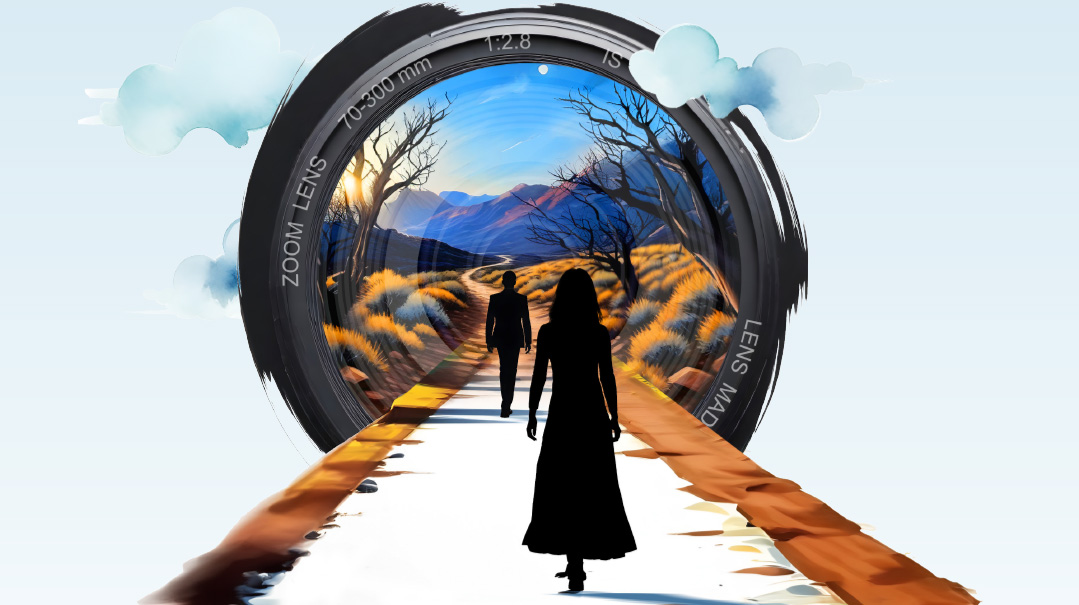Last Stop: Chapter 7
| March 28, 2023Naftali has never felt more like a cautionary tale

“Good morning, Yudi,” Naftali says pleasantly.
Yudi gifts him with a glare sharp enough to cut through steel. “Don’t talk to me, Mr. Hartman,” he says coldly. He climbs onto the bus, stalks to the back, and sits as far away from Naftali as possible.
Naftali takes a deep breath and drives on. It’s going to be a long day.
It had been a relief to come home this morning and find Chana still asleep. He’d been afraid that she might broach the topic of schooling again, that she’d point out all the ways that he’s failed his family with this job. And then, what choice would he have? If not schooling, it’ll be something else she’d suggest, some better job than the one he’s chosen.
Even today, with a furious Yudi in the back, driving the bus is comforting. It’s the only thing in his life that he feels like he has a handle on right now. But now, the boys climb on and look at him with discomfort or pity, murmuring among themselves, and Naftali has never felt more like a cautionary tale. Learn well or you might turn out like Rabbi Hartman’s brother. Study hard or you’ll be driving a bus one day.
One of the other drivers claps his shoulder when Naftali gets off his bus. Yoel has been driving buses for 20 years, and he doesn’t seem bothered at all by it.
“Let them whisper,” he says. “When it comes down to it, you have a steady job that supports your family and gives back to the community. No difference between a bus driver and a store clerk or a maintenance worker. Believe me, they’d notice if you were gone.”
“You’re right,” Naftali says, though he doesn’t quite believe it.
The hallways are even worse. Naftali has never flourished under attention, and he is stricken with the sudden urge to flee from this school and never return. He can disappear, move across the country with his reluctant family, and start anew. He can hide in his bus, drive away and change his name. Maybe grow out his beard more and dye his hair so no one will ever recognize that he was Eliezer Hartman’s brother.
There are many options. He takes the worst of them and remains.
He buries himself in work today. He half-expects Eliezer to appear at some point, to confront him with what he’d let slip to the school or to enter with apologies that he hardly means, but the office is silent.
The only hint of action is when Yudi inevitably winds up in the complex, his voice louder and sharper than usual as Eliezer reminds him that the ski trip next week is negotiable. Yudi doesn’t stop in Naftali’s office, doesn’t acknowledge him at all on the bus, and Naftali drives to Meadowbrook in impenetrable silence.
At home, he does kriah with Ari and helps Shayna with a diorama that she’s working on for science class.
“We need to make an ecosystem,” she informs him. “What’s an ecosystem?”
He shapes clay into delicate animals for her, and she glues them into place. “Shouldn’t you know that?”
Shayna scoffs. “I know how many tiles there are in the ceiling of the science lab,” she says. “And how many markers Rochie has on her desk. It’s a lot of markers. I need a bridge over the pond,” she decides suddenly.
Naftali finds little scraps of wood in the garage, and carefully, patiently, he crafts a curved little bridge in Shayna’s shoe box, firm enough that Ari can walk his Mentchies over it with marked wonder.
Chana bustles around their spot at the dining room table, delegating jobs to each of the girls. Mindy packs lunchboxes and Rina puts Shira to bed. Naftali is polite when Chana speaks to him, but there’s an unspeakable gulf between them.
She waits until the children are asleep before she says, almost timid, “I thought we could talk about last night.”
The words freeze the blood in Naftali’s veins. “I’d rather not,” he says, his voice rigid. He tries to make it gentler. “I’m tired,” he adds. “It’s been a long day. I really just need to sleep now.”
“Oh,” Chana says. Her brow creases. “Okay.” He leaves her at the bottom of the stairs, watching him go, and he feels even worse than he’d thought was possible.
He sleeps less than he’d hoped to and wakes up exhausted.
The morning ride is rough. The evening is interminable. It’s another day like the last, drenched in the failures of his life for everyone to see, and Yudi still refuses to speak to him.
He feels as though he’s stumbling through the dark as he drives, the headlights that had always been so clear now a glaring omen instead, and the chill of the wind seems to suck all the oxygen from the bus. When he glances at the rearview mirror, he can see Yudi glaring at him from the back, that same betrayal still raw in his gaze.
Maybe it’s because the ride feels more oppressive than usual that Naftali doesn’t notice at first that the bus is a little harder to handle tonight, a little noisier and tougher on the turns. It isn’t until he’s driving down the quiet road near the water on the way to Meadowbrook that he catches the telltale scent of trouble.
Buses are fickle things, large and loud but surprisingly delicate, and they break down often. Naftali stops at a red light and has to labor to keep the bus moving, coaxing it to the flat grass at the side of the road with jerky, slow movements. When he glances at the mirror now, he can see the billowing smoke beyond the back window, just past Yudi’s stiff face.
He phones in the broken-down bus and his location, then clears his throat. “Looks like the bus broke down. We should get off while we wait for our ride,” he calls, and he’s careful to keep his tone casual, as though there is no tension between him and Yudi today. “You never know what this bus might do now.” He’s never seen a bus explode, but this week has been just bad enough that tonight might be a first.
Yudi glowers at him, then gets up, stalking past him off the bus. He keeps going, walking along the water, and Naftali stifles the urge to follow him and make sure that he’s safe. They’re in the middle of nowhere. Yudi might be unpredictable, but he isn’t going to strand himself a 90-minute walk from his house.
He can see Yudi in dim streetlights, a single figure in the night as cars speed past him on the road, and Naftali breathes a sigh of relief when Yudi stops moving. The boy crouches down, busy with something that Naftali can’t make out.
The ground is flat but coated in rocks that make for a slow, shuffling walk across them. It makes Naftali’s walk gradual, with plenty of time for Yudi to see him coming, and he’s quietly encouraged when Yudi glances up and doesn’t walk away. Instead, Yudi busies himself more intently with his task.
His task, Naftali discovers, is gathering up larger rocks and twigs. The rocks are arranged in a neat fireproof circle, the twigs set in its center. Yudi looks up at Naftali with an expression of pure defiance and then pulls another lighter from his pants pocket and lights the twigs. They catch fire after a few sputtering attempts, and warmth builds in front of Naftali.
Naftali puts aside any comments he might have made about the lighter, were they on better terms. Instead, he says, “You’re good at that.”
Pride reigns victorious over pique. Yudi’s chin lifts, and he says, “I can start a fire anywhere.”
Naftali crouches next to the fire, holds out his hands and feels the warmth sink into them. “I was good with my hands,” he says, remembering his own high school years. “I used to like to build miniatures. A tiny shul, a little army of horses and riders.” They’d filled his childhood room until he’d had to build shelves to house them, and seeing them had filled him with satisfied pride. “I haven’t thought about that in a while.”
Yudi watches him, silent and inscrutable. Naftali takes it as an invitation to continue. “For a while after I got married, I did fix-it work,” he says. “I didn’t have the business sense to make it a full-time job, though, and it wasn’t making me much money. So I found other things to do.”
He’d picked up jobs as the opportunities had come, had followed a few other friends who’d washed out of yeshivah early on. They’d gotten good at it, had become very successful. Naftali had run out of options and gone to Eliezer for help. “It was my thing for a while, though. Building things made me feel good.”
He’d liked the sense of creating something, of making sense out of pieces and parts in the way that he’d never been able to do with Gemara or math. The hobby had fallen to the wayside once he’d started working, his self-worth measured in income instead of joy, and he doesn’t know where he’d stored all his old projects.
“I feel good when I’m destroying things,” Yudi says. “When I take something that’s big and powerful and—” There’s a piece of driftwood near them, large and jagged, and he holds it out to the fire. It hisses at first, still wet, but the flames lick at it until it catches them. “Everything burns eventually. Everything turns into the same ash.”
He stares at the fire as though hypnotized by it, and Naftali waits, afraid to shatter the spell. It’s disturbing. It’s illuminating.
“Are you two close?” Yudi asks.
He doesn’t need to explain who he means.
“Not exactly,” Naftali admits. “Our wives are best friends. We live in the same community. I don’t think — I don’t think we’d have much of a relationship if not for that.”
“Yeah.” Yudi is less hostile now, more thoughtful. “I used to want a brother,” he says. “I thought it would be better than being alone. But having a brother like Rabbi Hartman is way worse than having no brother at all.”
And Naftali knows that he is forgiven. He shakes his head. “He’s always been good at taking care of me,” he says, a mild defense that isn’t one at all. Eliezer still wants to take care of Naftali, still sees him as a little boy who needs his hand held through life, and it shames Naftali each time he proves Eliezer right. “He’s done a lot for me over the years.”
“Yeah,” Yudi says. “But he’s the guy in the big office upstairs.” He pulls the driftwood from the fire, holds the thick piece in his hand and watches it burn like a torch. “He makes all the decisions. No one else gets to be on his level. I’d hate being his brother,” he says.
It isn’t an attack on Eliezer. It’s just truth, stated clearly and with perfect understanding. It stings Naftali but feels oddly reassuring at the same time. “It’s complicated,” he says.
“I don’t think so,” Yudi says, and he puts the driftwood back into the fire and stands. “Check out the lights across the water,” he says suddenly, and they stand together and talk about inane things until the bright headlights of another bus illuminate the road, come to pick Yudi up, and bring him home.
A more experienced mechanic is on the bus, too, with a tool bag in hand, and Naftali remains at the fire while the mechanic fixes his bus. The piece of driftwood sags at the center, fire bursting from crevices within it, and it crumbles into ash before Naftali’s eyes.
to be continued…
(Originally featured in Mishpacha, Issue 955)
Oops! We could not locate your form.



